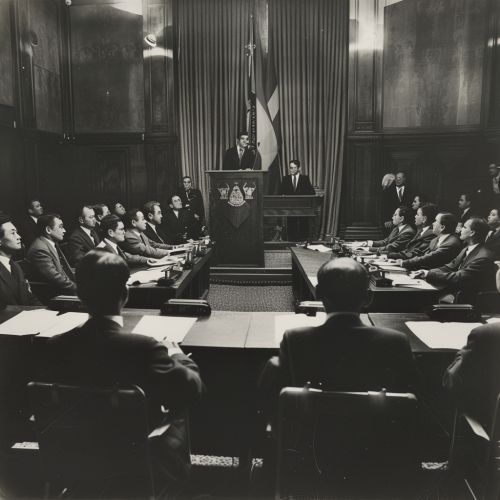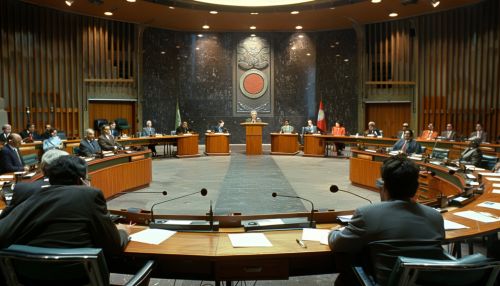People's Council
Introduction
The term "People's Council" refers to a governing body or assembly that represents the interests and voices of the general populace within a specific political or administrative framework. These councils are often established to ensure participatory governance, where citizens have a direct or indirect role in decision-making processes. The structure, function, and influence of People's Councils can vary significantly across different countries and political systems.
Historical Background
The concept of a People's Council has historical roots in various forms of governance throughout human history. Ancient civilizations, such as the Athenian democracy, employed assemblies where citizens could voice their opinions and vote on matters of state. Similarly, the medieval veche in Eastern Europe and the thing in Scandinavian societies were early examples of community-based decision-making bodies.
In the modern era, People's Councils became more prominent during the 20th century, particularly in socialist and communist states. The Soviet Union established a system of soviets, or councils, at various levels of government, which were intended to represent the working class and peasantry. These soviets played a crucial role in the governance structure of the USSR and influenced similar bodies in other socialist states.
Structure and Function
People's Councils can be structured in various ways, depending on the political system and cultural context. Generally, they are composed of elected or appointed representatives who serve specific constituencies. The primary functions of People's Councils include:
- **Legislation:** People's Councils often have the authority to draft, debate, and pass laws. This legislative function ensures that the laws reflect the will of the people.
- **Oversight:** These councils typically have oversight responsibilities, monitoring the actions of the executive branch and other government agencies to ensure accountability and transparency.
- **Representation:** People's Councils serve as a platform for representing the diverse interests and concerns of the populace. This representation can be direct, through elected representatives, or indirect, through appointed members.
- **Advisory Role:** In some political systems, People's Councils act as advisory bodies, providing recommendations and feedback to the government on various policy issues.
Case Studies
Soviet Union
In the Soviet Union, the system of soviets was a cornerstone of the political structure. The highest body was the Supreme Soviet, which functioned as the national legislature. Below it were regional, district, and local soviets, each representing their respective constituencies. The soviets were intended to be democratic institutions, but in practice, they were often controlled by the Communist Party, limiting their independence and effectiveness.
China
In the People's Republic of China, the National People's Congress (NPC) is the highest state body and the national legislature. The NPC is composed of deputies elected from provincial congresses, autonomous regions, and municipalities. It has the authority to enact laws, amend the constitution, and oversee the work of the government. The NPC operates within the framework of the Communist Party of China, which maintains significant influence over its proceedings.
Cuba
Cuba's system of People's Power includes the National Assembly of People's Power, which is the supreme body of state power. The assembly is composed of delegates elected from municipal assemblies, which are directly elected by the citizens. The National Assembly has legislative authority and oversees the work of the Council of State and the Council of Ministers. The Cuban system emphasizes grassroots participation and local governance.


Contemporary Examples
Venezuela
In Venezuela, the communal councils are grassroots organizations that allow citizens to participate directly in local governance. These councils are composed of community members who work together to address local issues and implement development projects. The communal councils are part of a broader effort to promote participatory democracy and decentralize power.
Vietnam
Vietnam's system of People's Councils operates at multiple levels, including provincial, district, and commune levels. These councils are elected bodies that represent the interests of their constituencies and have legislative and oversight functions. The People's Councils work closely with the Communist Party of Vietnam, which plays a central role in the political system.
Iran
In Iran, the Islamic Consultative Assembly, also known as the Majlis, serves as the national legislature. The Majlis is composed of representatives elected by the citizens and has the authority to pass laws, approve the budget, and oversee the executive branch. The political system in Iran combines elements of theocratic and democratic governance, with the Majlis playing a key role in the legislative process.
Challenges and Criticisms
People's Councils, while intended to enhance democratic participation, often face several challenges and criticisms:
- **Political Control:** In many cases, People's Councils are dominated by a single political party or group, limiting their independence and effectiveness. This control can undermine the democratic principles that these councils are supposed to uphold.
- **Limited Power:** People's Councils may have limited authority and resources, restricting their ability to influence policy and governance. This limitation can result in frustration among citizens and representatives.
- **Bureaucratic Inefficiencies:** The functioning of People's Councils can be hindered by bureaucratic inefficiencies and lack of coordination with other government agencies. These inefficiencies can impede the timely implementation of decisions and policies.
- **Representation Issues:** Ensuring fair and equitable representation in People's Councils can be challenging, particularly in diverse and multi-ethnic societies. Marginalized groups may struggle to have their voices heard and interests represented.
Conclusion
People's Councils play a vital role in promoting participatory governance and ensuring that the voices of citizens are heard in the decision-making process. While they face various challenges and criticisms, these councils remain an important mechanism for enhancing democratic accountability and transparency. The structure and function of People's Councils continue to evolve, reflecting the changing political and social landscapes of the countries in which they operate.
